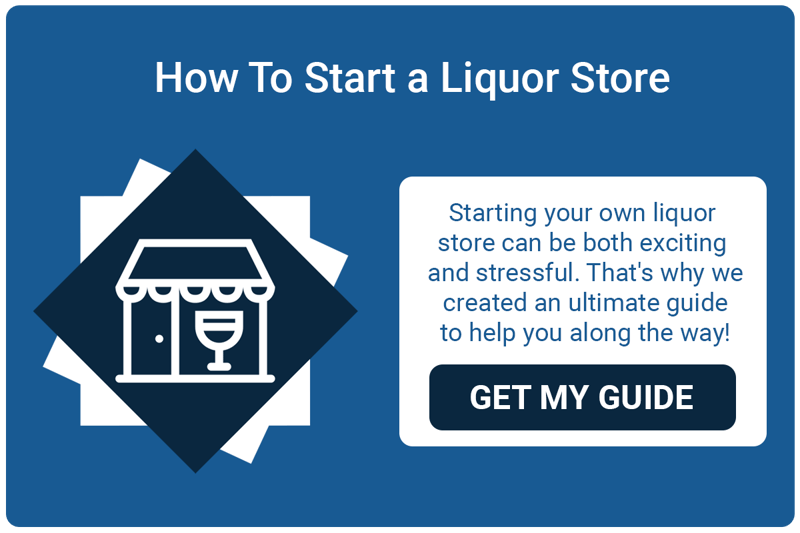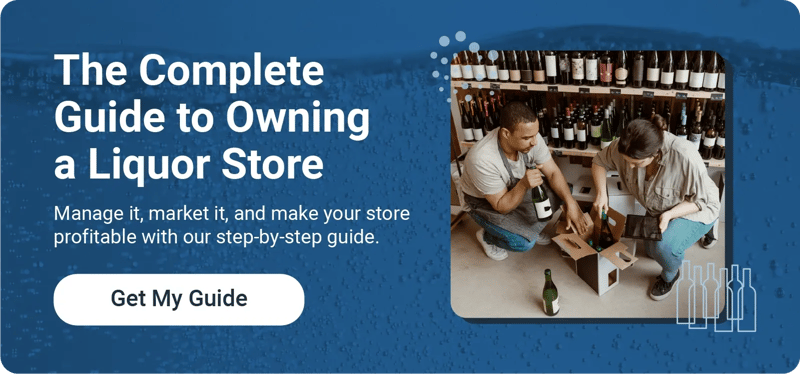A well-run local liquor store can be a highly profitable and scalable business. But getting started isn’t straightforward, especially when it comes to getting the correct liquor license.
Many first-time business owners are unsure where to start in a highly regulated industry with complex (and often confusing) rules.
While exact rules vary widely from state to state, here are a few resources to help you get started and make the process less intimidating.
Follow these steps to learn how to obtain the right license to get your liquor flowing and business running smoothly.

How Much Does a Liquor License Cost?

Unfortunately, there’s no straightforward answer.
The exact process and cost of a liquor license varies considerably by state. That’s because after prohibition was repealed, alcohol laws were left entirely to local governments, which is why liquor rules can vary so heavily between states, counties, and even towns.
That said, the average cost of a liquor license is around $1,500 at a minimum.
What Is an Alcohol Control State, and How Does It Affect Licensing?
Alcohol control states are those in which the state government directly regulates the sale and distribution of alcohol. Some states apply this regulation at the wholesale level, but others require alcohol to be sold through state-run liquor stores.
There are currently 17 alcohol control states in the U.S.
- Alabama
- Idaho
- Iowa
- Maine
- Michigan
- Mississippi
- Montana
- New Hampshire
- North Carolina
- Ohio
- Oregon
- Pennsylvania
- Utah
- Vermont
- West Virginia
- Wyoming
How does this affect licensing? The general answer is that while the process is largely the same, competition and costs for liquor licenses in control states tend to be higher.
Some of states may also require additional licensing steps, site inspections, or training to get a liquor license.
Last, there may be restrictions on what you can sell. In some states, especially the seven states that sell through state-run stores, private operators only sell beer and wine (though you can still carve out a profitable niche selling local brews and specialty wines).
The seven states with state-run liquor stores are:
- Alabama
- Idaho
- New Hampshire
- North Carolina
- Pennsylvania
- Utah
- Virginia
5 Steps and Tips To Get a Liquor License
Even with a deep knowledge of liquor industry trends and a great business sense, you can’t get anywhere without the right licenses.
While alcohol licensing can be complicated, it’s a hurdle all liquor store owners must overcome — so don’t worry, you’ve got this!
Below is a breakdown of the overall process. We also have some state-specific resources available:
1. Get in Touch With Your State’s Alcohol Control Agency
Before you can apply for a liquor license, you need to know which license you need and if there are any specific local requirements.
These vary significantly from state to state, so make sure to contact your state’s alcohol governing agency. In most states, this is called the Alcoholic Beverage Control (ABC) Board.
This will help you navigate what licenses you need (including what class of license).

2. Confirm Your Local Zoning Rules
As the saying goes, “Location, location, location.” Choosing a great location is key to your liquor store’s success — but make sure your dream location works legally.
Some states have specific rules about where a liquor store can run. The most common restrictions are:
- Requiring a certain distance from schools and residences
- Not having multiple liquor stores within a certain area
- Requirements to notify any nearby neighborhoods
Therefore, it’s important to understand the local requirements at your desired location before you get into the application process.
Ideally, you would research these things as part of your liquor store business plan.
3. Figure Out What Type of Liquor License You Need
Once you understand how alcohol regulation works where you run your business, you’ll need to determine whether you need an on—or off—premises license.
- On-premises: Are you planning to open a small bar in your wine or liquor store? You’ll need an on-premises license that allows you to serve alcoholic drinks at your business.
- Off-premises: If you’re running a liquor store where you sell products that are for consumption elsewhere, you’ll need an off-premises license.
The costs and requirements for each type of license can vary (e.g., different licenses for beer and wine sales vs. liquor), so make sure you know what you need before you start the application process.
Liquor License Classes
Many states also have different classes of liquor licenses, essentially subcategories of on and off-premises licenses.
Some examples include:
- Tavern
- Hotel and lounge
- Beer and wine retailer
- Liquor retailer
- Short-term event license or trade show
- Drug store or corner shop licenses
- Grocery store license (for beer and wine)
Different licenses are also required if you’re a wholesaler or producer (breweries, distilleries, and wineries).
4. Fill Out Your Liquor License Application
When you decide which liquor license you need, start gathering the information and documents required for the application.
Again, licenses vary by state — but most licenses will at least require:
In most places, you can find the liquor license application online — so once you have your documentation, you’re ready to apply!
Keep in mind that you may have to fill out multiple applications for state and local licenses.
At this stage, you’ll also be expected to pay a non-refundable processing fee (usually a few hundred dollars).
Important Note: Take your time! You may be eager to get your business running, but rushing the application process is a mistake. Errors or missing pieces of your application can result in lost money and longer waits.
5. Wait Patiently for Approval
Now, you wait. Once you submit your application, it can take anywhere from several weeks to a year for everything to process.
For example, the waiting period for a New York liquor license is between 22 and 26 weeks.
Some states are considered “quota states,” meaning that the number of licenses available depends on the area's population. License fees in quota states tend to run higher because they’re much more in demand — and you could wait much longer.
Quota states include:
- Alaska
- Arizona
- Florida
- Idaho
- Kentucky
- Massachusetts
- Michigan
- Minnesota
- Montana
- New Jersey
- New Mexico
- Ohio
- Pennsylvania
- South Dakota
- Utah
- Washington
There’s plenty of work to do while you’re waiting, so use that time wisely. Start thinking about your store layout, customer loyalty programs, and other aspects of your business so you can hit the ground running.
Once your license is approved, you’ll be expected to pay the full licensing fee.
6. Stay Compliant and Remember Your License Renewal
This one’s simple — once you’ve got a liquor license, don’t lose it.
Stay compliant with state laws, including correctly displaying your liquor license. Do everything you can to avoid selling to minors, as even an accidental sale can result in large fines or the loss of your license.
We recommend using a point of sale (POS) system with an integrated ID scanner. This will ensure you stay legally compliant without slowing down your checkout process.
Last, liquor licenses are granted for a specific period of time, usually one to three years. Remember to renew when the license expires, and make sure you have the renewal fee ready—it can range from a small fee to the full amount originally paid for the license.
Keep Things Running Smoothly With a POS System Built for the Liquor Industry
The liquor industry is as rewarding as it is complex — and getting a license is only the first step and not a guarantee of success.
To take your liquor startup from a local curiosity to a community favorite, you’ll need ways to maximize profits while delivering an exceptional customer experience.
That’s why you need a system built specifically for liquor stores. Bottle POS will help keep your new store running efficiently and make it easy to comply with local laws, thanks to integrated ID scanning, pre-built reports, and more.
When you’re ready to start your liquor store, get in touch to schedule a customized demo. Our liquor store experts are ready to help ensure you have everything you need to stay competitive and find long-term success.